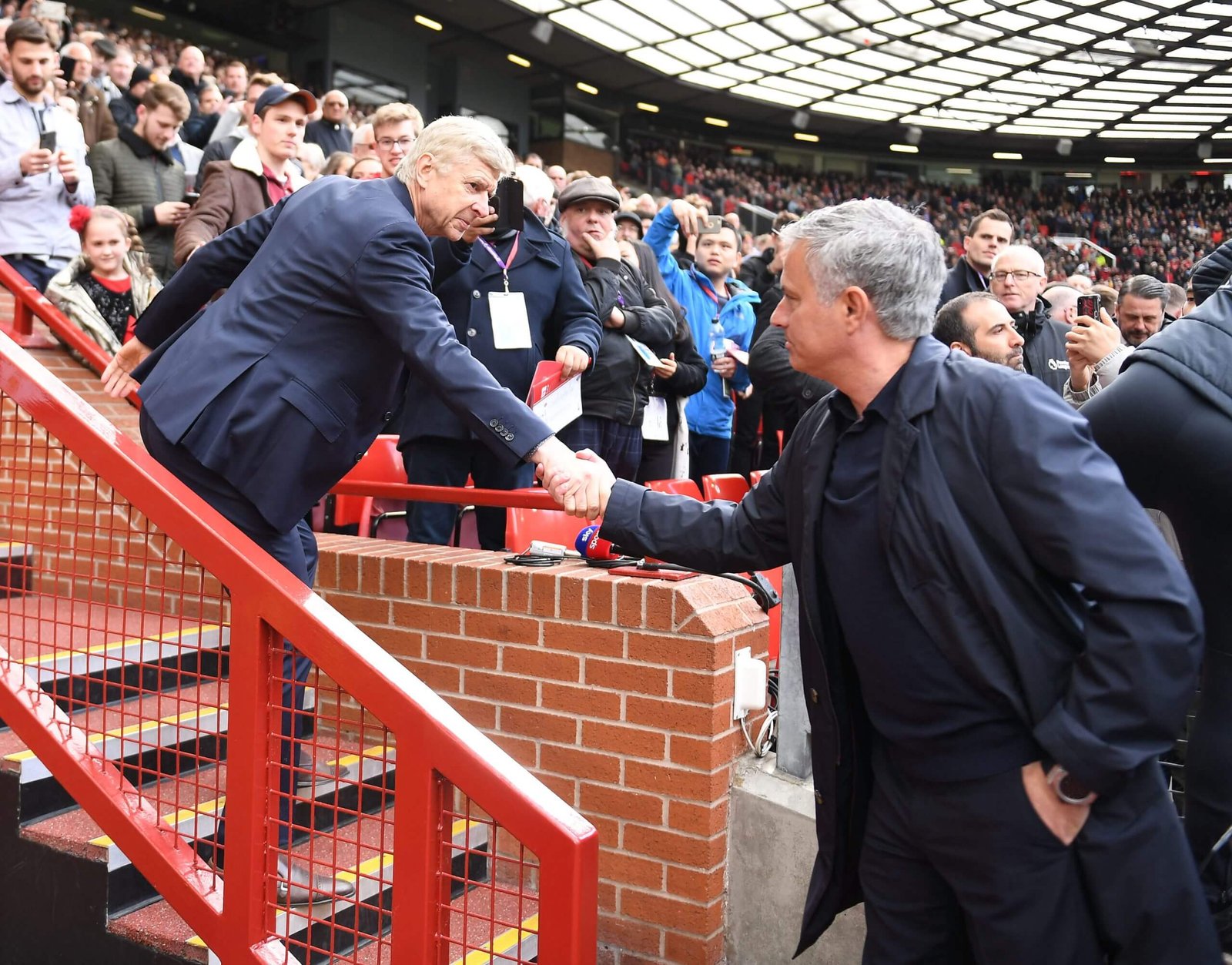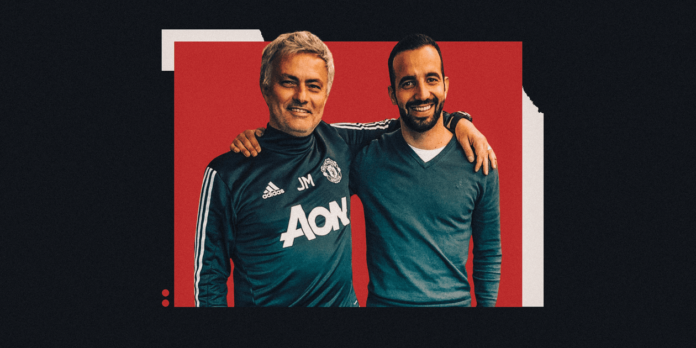When Ruben Amorim arrives at Carrington on his first day as Manchester United’s new manager, he will find himself in familiar surroundings.
Earlier this week, not long after The Athletic revealed United were working on a deal to appoint Amorim, an image of him and Jose Mourinho in the manager’s office at Carrington began to be widely shared across social media.
The photograph was taken six years ago. Amorim was visiting Carrington as part of a week-long internship, while studying for a masters’ degree in high-performance football coaching at the University of Lisbon.
The course was convened by Prof. Antonio Veloso, at the university’s faculty of human kinetics, and organised in partnership with Mourinho.
Veloso and Mourinho studied sports science together at the university as undergraduates in the 1980s. After re-establishing contact several decades later, Veloso proposed devising a course which would aim to bridge the gap between academic study and traditional coaching qualifications.
“The programme was finalised in Jose’s living room in London,” says Veloso, with much of it based on the gaps Mourinho felt he had in his knowledge when he started out as a young coach.
“He said at that time, I didn’t know how to work with the press. So on the programme, we have a module about building your career — organising your portfolio, how you communicate, how you talk with the media… .”
Dealing with the glare of the media will be a significant part of Ruben Amorim’s job at Old Trafford (Zed Jameson/PA Images via Getty Images)
Petter Skogsletten attended the course the same year as Amorim. “We went through absolutely everything that a manager needs to know to be able to start off,” he says. “Many courses usually focus on the coaching only on the pitch but this was all about the manager role itself.”
Veloso first learned of Amorim’s interest in the course through Filipe Celikkaya, who managed Sporting B until the end of last season. Although he did not possess an undergraduate degree, Amorim was able to enrol on the course as a former international player due to a partnership with the Portuguese Football Federation.
With the pedigree of 14 caps for Portugal and more than 150 appearances for Benfica, he immediately stood out among his peers.
“When we’d have guest coaches, or we were going over analysis, or anything we were doing, we’d want to hear from Ruben at some part of the conversation,” says Geoff Labine, another student on the course that year. “He had the most real feedback, the most experience playing at the highest level.”
Skogsletten says he learned a lot from him. “When he spoke, you could hear that he understood people. He understood players. He had a high understanding of the game.”
But Veloso was also pleasantly surprised to see how Amorim mastered the more theoretical aspects of the course. “We’d ask them to write an essay on a subject and he was excelling at that as well — from psychology to biomechanics to everything else.”
Amorim’s tactical principles were still taking shape at the time and he was not afraid to borrow concepts from established coaches. “When he’d be describing an idea he wanted to use, he’d say: ‘I took this idea from (Antonio) Conte, this from Mourinho, and I think they’ll be a good combination’,” says Veloso.
“It’s like a good chef. You are inspired by what you see from other good chefs, then you do your own recipe.”
The competitive streak and high standards from his playing days would occasionally creep out in the odd training session, with a little shake of the head when a coach did not pick up on his cues to make a movement or a run.
But ‘humble’ is the one word that Veloso, Skogsletten and Labine all use to describe Amorim. “For him, it doesn’t matter if you’ve been playing at this level, he’s at the same level as you,” says Skogsletten. “He opened up and he was himself with you.”
Labine agrees. “I would joke with Ruben because he’s driving the most unassuming Smart car, those little cube cars. I’m looking for the Maserati or the Bugatti or something. He goes: ‘No Geoff, you don’t understand. I’m different. I’m not like that.’”
As part of the course, students had to secure 50 hours’ worth of experience in a coaching environment. But every year, Veloso and his colleagues would select those at the top of the class to serve their internship embedded within Mourinho’s coaching staff.
To earn that spot, students had to score well academically and impress in a practical setting on the training pitch. “If you were able to make adjustments on the go — pick a player off this team, put a player on that team to help create the competitive balance that you’re looking for — that was a big point,” says Labine.
Amorim was one of three students from the class of 2017 selected to attend Carrington, as was Labine.
The interns sat in on six training sessions over the week, in preparation for a visit from Arsenal the following weekend — which happened to be Arsene Wenger’s last game at Old Trafford as a manager.

Jose Mourinho and Arsene Wenger face each other for the last time as managers (Stuart MacFarlane/Arsenal FC via Getty Images)
It was largely an observational exercise. “We weren’t touching cones,” says Labine. Amorim and his fellow interns instead essentially spent their time shadowing Mourinho, soaking up his wisdom and learning what the average week is like when you are the manager of one of the biggest clubs in European football.
On a typical morning, they would arrive at Carrington at around 8am and mill about in the canteen with players and staff. “Around nine, the training began outside,” says Labine. “We would go out with Jose and sit with him and chat in the dugouts.
“He would have some time where he would just let his assistant Rui (Faria) run the session, so Jose would come over and talk. Then he would break out in the 11-vs-11 on the field and we’d talk with his assistant.”
After returning to the canteen for lunch with some of the players, there might be a debrief back in Mourinho’s office. Otherwise, the interns would concentrate on their coursework.
Amorim’s task for the week was to produce a report with his fellow interns on what they observed — what went well in training, what ideas they recognised from what they had learned on the course, what they might change if they were running the sessions themselves. It was not all hard work, though.
Come the evening, Mourinho occasionally took the interns out to his private room in the basement of Tapeo and Wine, a tapas restaurant owned by Juan Mata, formerly on Deansgate until its closure in 2020. “As soon as we walked in the restaurant, it would be like a hush over the people eating,” Labine recalls.
That week, it was the first legs of the Champions League semi-finals — Bayern Munich vs Real Madrid, Liverpool vs Roma. Amorim and Labine spent a couple of evenings watching the games while listening to Mourinho’s war stories, as he picked out players on the TV who he had coached and reminisced about what they were like to manage, occasionally while over-ordering on the desserts.
Mourinho was generous with his time to each of the interns but built up a particular rapport with Amorim, given their shared nationality, language and experience of working within Portuguese football. “Jose already had a very good idea about Ruben,” says Veloso. That he had played with Victor Lindelof and Nemanja Matic at Benfica helped, too.
“You could tell they were having more private conversations,” says Labine. “I think he was just giving Ruben pieces of advice, little things about how to run a professional team. I think before the course even started, they had identified Ruben as one of the next great Portuguese coaches.”
Comparisons with Mourinho have abounded ever since Amorim’s emergence as Portuguese football’s brightest young coach, and United’s incoming manager has previously described Mourinho as his “reference”. Labine sees similarities but also differences between the two, though.
“He’s less pragmatic than Jose,” says Amorim’s fellow intern. “He is much more diplomatic and less authoritarian, even the way that he’ll speak to people is a little less abrasive and more like a team, more together. We’re on the same team. Although they have similar philosophies, I think there was a lot different.”
The student subsequently turned teacher. Amorim returned to the faculty over the following years to give his own lectures on the course, always delivered in fluent English.
Two years ago, Amorim invited the class to Sporting’s academy for an insight into his training methods and to watch a session. Two of his assistants, Carlos Fernandes and Paulo Barreira, led a seminar with the students on match analysis.
Fernandes is also a graduate of the university, studying for his bachelor’s degree at the faculty, and has been earmarked to join United’s coaching staff.
But it is Amorim who will be sitting behind the desk in the manager’s office at Carrington, less than a decade on from posing for a photograph with Mourinho in the same room.
“He’s really highly ambitious,” says Skogsletten, who remembers speaking with Amorim about how they would go about getting their start in coaching. Amorim was itching to start right away and landed his first job with Casa Pia only a few months after the course concluded.
“He was looking for that opportunity back then, but I don’t think he knew where it was going to end. I think this is a path that he has been exploring during his success… I think he has just seen a path that has opened up in front of him and moved.
“Everyone in that group could see him becoming successful,” he adds. “What we didn’t see was what this part would look like — will it be an assistant coach? Will it be a manager? Where does it end?
“We couldn’t see this happening that fast, but we knew for sure that sometime in the future, he had all the qualities he needs.”
(Top photo: High Performance Football; design: Eamonn Dalton)
Read the full article here


